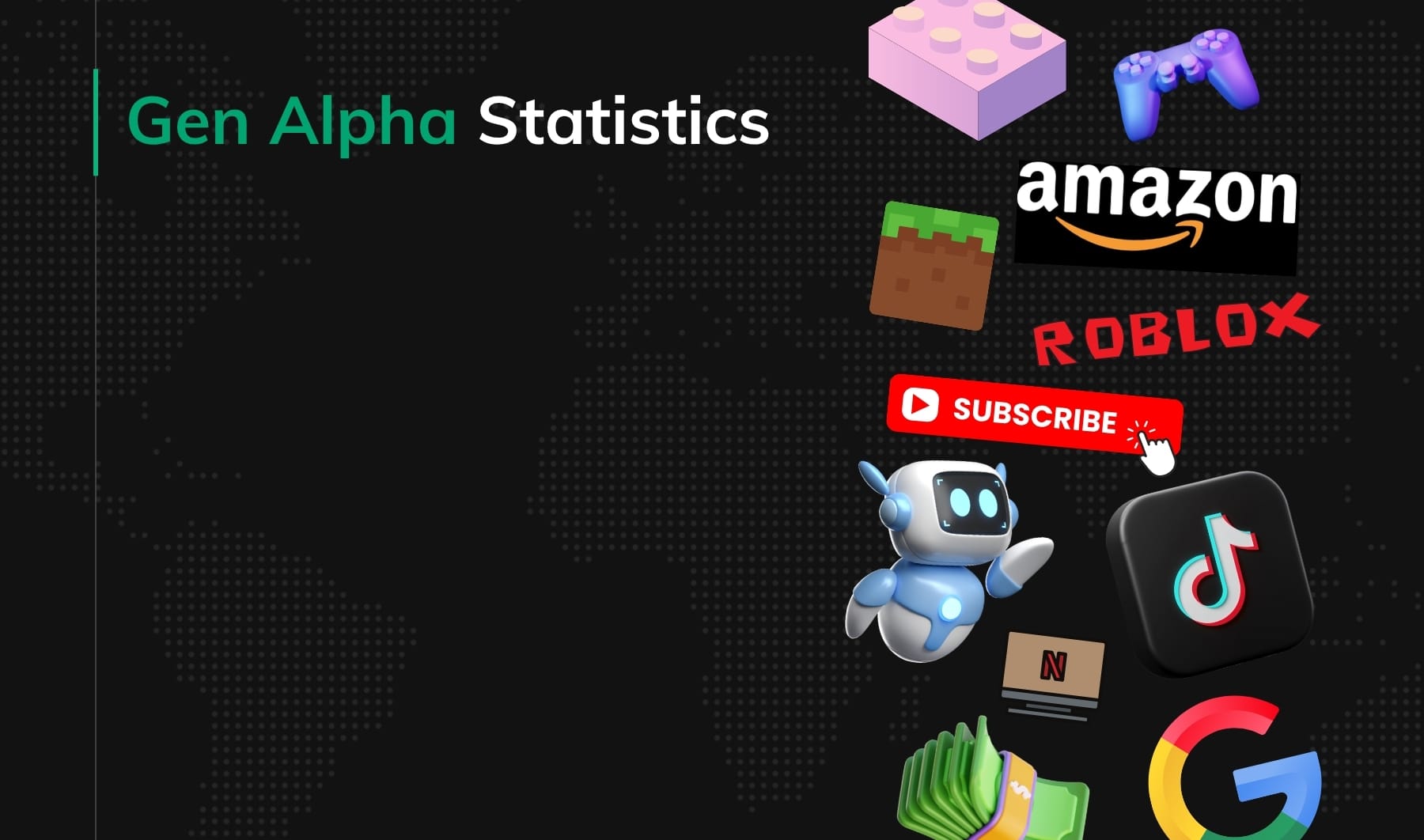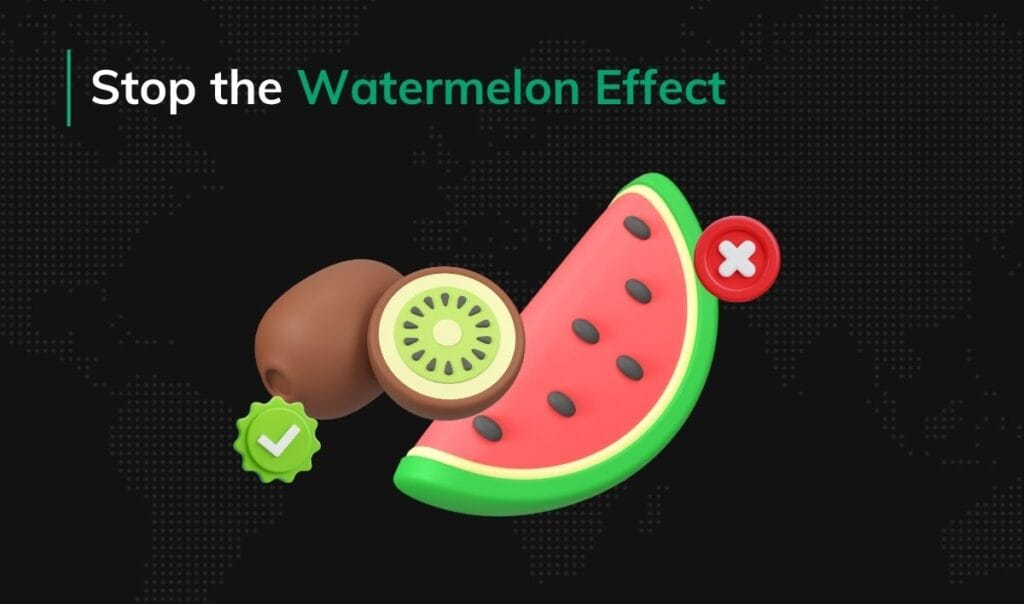Generation Alpha Statistics (220+ stats for 2026)

Generation Alpha is anticipated to comprise 2 billion people by 2025, making them potentially the largest generation in history. (ALMANAC)
If you want to market them, you need to understand Gen Alpha. These latest statistics reveal their financial habits, digital behavior, and growing influence on household spending. Check our list of Gen Alpha statistics below.
Before you move on, you might first want to read our article on Gen Alpha financial habits.
💸 Financial Landscape of Gen Alpha
Gen Alpha is already engaging with money—earning, spending, and saving. These stats reveal how their financial habits are taking shape, offering key insights for those tracking youth trends.
Generation Alpha data: Earning Money, Allowances & Side Hustles
Gen Alpha earns through chores, allowances, and early entrepreneurship. These stats highlight their growing engagement with personal finance.
- $2,340 is the typical annual spending money Gen Alpha children have as of May 2024. (DKC)
- $45 is the median weekly spending money for Gen Alpha children as of May 2024. (DKC)
- $100 is the weekly spending money for Gen Alpha children in households earning over $100,000 as of May 2024. (DKC)
- 90% of Gen Alpha children earn their own money as of May 2024. (DKC)
- 73% earn money through positive reinforcement (e.g., grades, behavior) as of May 2024. (DKC)
- 69% earn money doing chores as of May 2024. (DKC)
- 47% earn through odd jobs like babysitting as of May 2024. (DKC)
- 36% earn money from online selling or reselling as of May 2024. (DKC)
- 21% of Gen Alphas claim they have already started a side hustle or business. (Acorns, Opinium Survey data)
- Nearly half (48%) of Gen Alphas are interested in starting a business or side business in the future. (Acorns, Opinium Survey data)
- Gen Alphas who receive an allowance are more likely to have started a side hustle (24%) than those without (13%). (Acorns, Opinium Survey data)
- 50% of Gen Alphas who earn an allowance are planning to start a side hustle in the future, compared to 40% of those who don’t receive an allowance. (Acorns, Opinium Survey data)
- The top motivation for Gen Alpha starting a side hustle is to earn extra money (58%). (Acorns, Opinium Survey data)
- The second most popular reason for Gen Alpha starting a side hustle is to pursue a hobby or passion (37%). (Acorns, Opinium Survey data)
- Gen Alphas who learn about money on social media are more likely to start a side hustle to pursue a hobby/passion (43% vs. 37% total). (Acorns, Opinium Survey data)
- Gen Alphas who use financial education apps are more likely to start a side hustle to save for the future (39% vs. 31% total). (Acorns, Opinium Survey data)
- On average, Gen Alpha earn $27 monthly for household chores and $23 monthly for non-chore-related allowances. (Acorns, Opinium Survey data)
- In the past year, Acorns Early Gen Alpha users earned almost $7 million and saved over $3.5 million (Acorns Early User Data). (Acorns)
- Older Gen Alphas (10-14 years old) receive on average $4 more for chore-based allowances ($29 vs. $25) and $3 more for non-chore allowances ($24 vs. $21) than younger Gen Alphas. (Acorns, Opinium Survey data)
- Among household chores, washing dishes earns Gen Alpha the most, at an average of $5.73 per task (Acorns Early User Data). (Acorns)
- Over three quarters (78%) of UK Gen Alpha (aged 8-14) have earned money in the past year. (Visa)
- Almost half (43%) of UK Gen Alpha (aged 8-14) who have earned money in the past year used technology to help them do so. (Visa)
- Among UK Gen Alpha (aged 8-14) who earned money, chores like cleaning the house and cutting the grass were the largest income-generating activity for 71%. (Visa)
- Among UK Gen Alpha (aged 8-14) who used technology to earn money, social media was the most popular tool for income generation for 26%. (Visa)
- Nearly a quarter (23%) of older UK Gen Alpha children (aged 12-14) use online marketplaces to help them generate income. (Visa)
- Across the EMEA region, 31% of 10-14-year-olds report earning their own money, a 51% increase over the last two years. (The Insights Family)
- 28% of 6-9-year-olds in EMEA report earning their own money. (The Insights Family)
- In Germany, 40% of 10-14-year-olds earn their own money. (The Insights Family)
Key figures for Generation Alpha: Spending Power & Habits
Where does Gen Alpha’s money go? These stats reveal clear spending patterns—from favorite categories to preferred stores.
- Gen Alpha has an estimated $11.3 billion in spending power (analysis by Cebr based on Acorns Early user data). (Acorns)
- The most popular spending categories for Acorns Early Gen Alpha users are gaming, technology, and digital marketplaces. (Acorns, Acorns Early User Data)
- The most popular stores where Acorns Early Gen Alpha users spend are Amazon, Microsoft, and Playstation. (Acorns, Acorns Early User Data)
- Top 3 stores by total amount spent by Acorns Early Gen Alpha users: Amazon ($1,083,815), Microsoft ($674,791), and Playstation ($532,666). (Acorns, Acorns Early User Data)
- Two-thirds (64%) of children aged 8-15 globally are spending pocket money independently in the digital economy. (Checkout.com)
- A third (33%) of children in the US (aged 8-15) make e-gaming purchases independently each month. (Checkout.com) (Also phrased as “commonly make in-app purchases with their pocket-money”).
- In the UK, 71% of children are making their own purchases for non-essential items by the time they are 15. (Checkout.com)
- 75% of 8-year-olds in the UAE make payments themselves, rather than via a grown-up. (Checkout.com)
- 92% of 15-year-olds in the UAE make payments themselves, rather than via a grown-up. (Checkout.com)
- In China, 65% of 15-year-olds are making their purchases themselves. (Checkout.com)
- For 15-year-olds in China making their own purchases, social commerce is their most frequent shopping channel (51%). (Checkout.com)
- 74% of German 10-14-year-olds spend most of their money online, which is 42% higher than the EMEA regional average. (The Insights Family)
- Gen Alpha in EMEA are more likely to plan purchases in the near future for food and drinks (+24% compared to average), gaming (+23%), and sports equipment (+25%) over the next three months. (The Insights Family)
- 45% of Gen Alpha girls are splurging on TikTok Shop hauls or other online retailers. (Beano Brain)
- 39% of Gen Alpha boys have spent their own money on in-game currency. (Beano Brain)
- 48% of Gen Alpha are still shopping on the High Street or at the Mall. (Beano Brain)
Saving Habits & Goals
- 95% of U.S. Gen Alpha parents say it is their responsibility to save for their child’s future (Opinium Survey data). (Acorns)
- 36% of U.S. Gen Alpha parents say they have not started saving for their child’s future (Opinium Survey data). (Acorns)
- Gen Alpha are reportedly saving for: college (19%), their first car (24%), an emergency fund (approximately 20%), their first home (11%), a side-hustle (approximately 10%), and retirement (6%). (Acorns, Opinium Survey data)
- 30% of Gen Alpha say they want to save so they don’t have to rely on their parents. (Acorns, Opinium Survey data)
- 15% of 6 to 14-year-olds (Gen Alpha) claim supporting their parents is a top reason for saving. (Acorns, Opinium Survey data)
- 11% of 6 to 14-year-olds (Gen Alpha) claim the impact of the cost-of-living crisis on prices is a top reason for saving. (Acorns, Opinium Survey data)
- Top savings goals for Gen Alpha are gaming or entertainment (47%) and technology (38%). (Acorns, Opinium Survey data)
- Acorns Early Gen Alpha users have birthdays, phones, and games as their top three categories with the highest savings (Acorns Early User Data). (Acorns)
- Gen Alphas have also started saving for mental health (4%) and weddings (4%). (Acorns, Opinium Survey data)
Financial Tools & Services
- 39% share purchase-enabled consumer apps (e.g., Starbucks app) with their child in May 2024. (DKC)
- 37% share banking/finance apps with their Gen Alpha child in May 2024. (DKC)
- 7% of children over 13 in the US use Buy Now, Pay Later (BNPL) as a payment method. (Checkout.com)
- 11% of children over 13 in the UAE use Buy Now, Pay Later (BNPL) as a payment method. (Checkout.com)
- 19% of children over 13 in China use Buy Now, Pay Later (BNPL) as a payment method. (Checkout.com)
- Less than 1% of children over 13 in the UK use Buy Now, Pay Later (BNPL). (Checkout.com)
- For 15-year-olds in China making their own purchases, QR codes (39%) and digital wallets (39%) are their preferred payment methods. (Checkout.com)
- German Gen Alpha (10-14) show a 79% increase in cryptocurrency ownership and use compared to the EMEA average of 24% for this metric. (The Insights Family)
Financial Literacy & Education
- 98% of parents teach or plan to teach budgeting to Gen Alpha children in May 2024. (DKC)
- 69% of parents give a set, regular allowance in May 2024. (DKC)
- 66% are planning to give a regular allowance in May 2024. (DKC)
- 41% are creating an investment strategy with their child in May 2024. (DKC)
- 80% of Gen Alpha claim to have learned about money from their parents. (Acorns, Opinium Survey data)
- Other main sources of financial education for Gen Alpha are family members (58%) and financial education at school (50%). (Acorns, Opinium Survey data)
- Gen Alphas who receive an allowance are more likely to have learned about money from social media (29% vs. 23%) and financial apps (14% vs. 9%) than those without. (Acorns, Opinium Survey data)
- 33% of older Gen Alphas (10-14 years old) claim to have learned about money from their friends, compared to 29% of those aged 6-9. (Acorns, Opinium Survey data)
- 81% of Gen Alphas say that they trust their parents the most on the topic of money. (Acorns, Opinium Survey data)
- Gen Alphas also trust teachers (9%), the president (3%), or celebrities like Taylor Swift (3%) for financial learning. (Acorns, Opinium Survey data)
- 35% of UK Gen Alpha (aged 8-14) learn about earning money by watching digital content creators, compared to 10% who learn from traditional sources such as books. (Visa)
Emotional Connection to Finances
- Nearly two-thirds of Gen Alpha children aged 10-14 feel happy (64%) and excited (62%) when thinking about money. (Acorns, Opinium Survey data)
- Gen Alpha children who receive an allowance are significantly more likely than those who don’t to associate positive emotions with money: happy (67% vs. 52%), excited (65% vs. 53%), and confident (45% vs. 30%). (Acorns, Opinium Survey data)
- Gen Alpha children without an allowance are significantly more likely to associate negative emotions with money: stress (21% vs. 13% of those with an allowance), confusion (13% vs. 6%), and boredom (7% vs. 4%). Acorns, Opinium Survey data)
- Gen Alpha children of parents who often talk negatively about finances are significantly more likely to associate money with stress (39% vs. 15% total). (Acorns, Opinium Survey data)
👑 Gen Alpha’s Influence
Despite their age, Gen Alpha wields strong influence—especially at home and in buying decisions. These stats reveal their growing persuasive power.
Insights into Gen Alpha trends: Influence on Household Spending & Parental Decisions
- 49% of household spending is influenced by Gen Alpha children’s opinions in May 2024. (DKC)
- 95% of parents discover new brands, products, or services through their Gen Alpha child in May 2024. (DKC)
- 64% are more likely to buy specific brands because of their Gen Alpha child in May 2024. (DKC)
- 40% say they now buy more ultra-luxury brands due to their Gen Alpha child in May 2024. (DKC)
- Gen Alpha’s opinions have the strongest influence on their parents regarding subscribing to streaming services (42%) and choosing restaurants (41%). (Acorns, Opinium Survey data)
- Over a third of parents (38%) say that their Gen Alpha children influence their own decisions to save more. (Acorns, Opinium Survey data)
- On average, Gen Alpha children influence a quarter (26%) of household spending. (Acorns, Opinium Survey data)
- The highest average household spend influenced by Gen Alpha children are food and drink ($45), clothing ($44), and technology ($37). (Acorns, Opinium Survey data)
- Gen Alpha children with an allowance influence a significantly greater share of household spending than those without (27% vs. 21%). (Acorns, Opinium Survey data)
- 58% of Gen Alphas have asked for something they saw on YouTube. (ALMANAC)
- 75% of Gen Alpha parents say they’ve bought their kid something they asked for after seeing it online. (ALMANAC)
- Generation Alpha (aged 8-15) drives over a quarter (27%) of their household’s non-essential monthly spend. (Checkout.com)
- Generation Alpha drives nearly a third (29%) of their household’s monthly spend on digital products. (Checkout.com)
- 29% of Millennial parents globally take responsibility for purchasing digital products each month for their Gen Alpha children. (Checkout.com)
- Generation Alpha’s purchase influence is greatest in online educational resources, which nearly half (47%) of parents purchase for their children. (Checkout.com)
- Entertainment streaming is purchased by a third (30%) of parents globally for their Gen Alpha children. (Checkout.com)
- Over a quarter (28%) of Millennial parents globally pay for monthly e-gaming services for their Gen Alpha children. (Checkout.com)
- Half (47%) of parents in the UAE pay for monthly e-gaming services for their Gen Alpha children. (Checkout.com)
- 59% of Millennial parents in China buy monthly digital educational resources for their children under 12 (Gen Alpha). (Checkout.com)
- Over 22% of Millennial parents in China purchase news media subscriptions for their children under 12 (Gen Alpha). (Checkout.com)
- Parents in the UK spend significantly on online education for their Gen Alpha children (39%). (Checkout.com)
- 32% of 10-14-year-olds across EMEA ask their parents for advertised products. (The Insights Family)
- 37% of younger kids (6-9 years old) in EMEA ask their parents for advertised products. (The Insights Family)
Influence on Broader Consumer Trends (e.g., Millennial parent shifts)
- 68% of parents are more likely to shop online because of their Gen Alpha child in May 2024. (DKC)
- 55% believe their child will use AI to shop in the future in May 2024. (DKC)
- 37% have used virtual try-on tech due to Gen Alpha in May 2024. (DKC)
- 35% have already used AI to inform a purchase in May 2024. (DKC)
- 35% now buy during limited-edition drops due to their child in May 2024. (DKC)
🛒 Consumer Behavior & Shopping
To reach Gen Alpha, you need to understand how they shop. These stats cover product discovery, brand views, and their role as emerging consumers. Gen Alpha shows unexpected consumer savvy. Stats reveal their shopping awareness and the enjoyment they get from the experience, according to parents.
General Shopping Savvy & Enjoyment
- 76% of parents say Gen Alpha children are better at making consumer decisions than they were at the same age in May 2024. (DKC)
- 91% of parents say their Gen Alpha child enjoys shopping in May 2024. (DKC)
- 84% say their child surprises them with shopping savvy in May 2024. (DKC)
Product Discovery
92% of parents say their Gen Alpha child is great at finding new products in May 2024. (DKC)
- Children (aged 8-15) around the world use social media as the go-to source for finding out about deals on products (UK: 48%, US: 57%, China: 56%, UAE: 41%). (Checkout.com)
Shopping Motivators
- Important factors for Millennial parents when purchasing for their Gen Alpha child include: educational (66%), sustainable (43%), locally-made (26%), gender-inclusive (25%), and charitable (24%). (ALMANAC)
- 66% of 10-14-year-olds in EMEA prioritize products and brands that make them feel special. (The Insights Family)
- 64% of 10-14-year-olds in EMEA cite their parents’ approval as the second most important shopping consideration. (The Insights Family)
- Other important shopping considerations for 10-14-year-olds in EMEA include health and wellbeing (63%), convenience (61%), value representation (59%), and reputation enhancement (56%). (The Insights Family)
Brand Perceptions & Affinity
- 87% of Gen Alpha kids are highly brand attentive in May 2024. (DKC)
- 69% of parents say Gen Alpha gravitates toward luxury brands in May 2024. (DKC)
- Social media’s most influential areas on Gen Alpha are brand preferences (37%) and travel goals (25%). (Acorns, Opinium Survey data)
- Friends have the strongest influence on Gen Alpha’s brand preferences (45%). (Acorns, Opinium Survey data)
- YouTube is the brand Millennial parents said they trust most for their children (53%). (ALMANAC)
- Among the top five brands Millennial parents trust most for their children, four are technology brands: YouTube (53%), Netflix (48%), Amazon (42%), and Google (39%). (ALMANAC)
- Nike is ranked as the coolest sports brand in both the UK & US in Beano Brain’s Top 100 Coolest Brands. (Beano Brain)
- Adidas is ranked as the second coolest sports brand according to Beano Brain. (Beano Brain)
- YouTube was ranked as the top coolest brand for kids and teens in 2024 by Beano Brain. (Beano Brain)
Impact of Advertising
- 40% of 10-14-year-olds in EMEA report becoming more interested in a product after seeing a relevant ad. (The Insights Family)
- 18% of 10-14-year-olds in EMEA say they would make a purchase themselves after seeing an ad. (The Insights Family)
- Self-directed purchases by 10-14-year-olds in EMEA have increased by 5% compared to the previous year. (The Insights Family)
- Traditional TV accounts for 31% of ad viewership among 10-14-year-olds in EMEA, a figure unchanged over the past year. (The Insights Family)
- For ad viewership among 10-14-year-olds in EMEA, YouTube ranks second at 22%, followed by TikTok (11%) and Instagram (6.8%). (The Insights Family)
- Traditional TV has the highest ad recall among 10-14-year-olds in EMEA (31%). (The Insights Family)
📱Digital Life & Media Consumption
Gen Alpha was born digital. These stats show their deep tech immersion—from device use to screen time and content habits.
Device Ownership & Early Tech Exposure
Gen Alpha starts young with tech. Device ownership stats show how early they begin using gadgets, marking rapid digital adoption.
- Gen Alphas on average start using a tablet at age 7. (ALMANAC)
- Gen Alphas own their first smartphone on average at age 8. (ALMANAC)
- 66% of Gen Alphas are growing up in a “smart home”. (ALMANAC)
- Research shows that 40% of toddlers will have a tablet by age 2 – with regular screen use. (Beano Brain)
Screen Time
- 77% of parents describe their Gen Alpha child as a screen addict in May 2024. (DKC)
Gaming & the Metaverse
Gaming is central to Gen Alpha’s leisure and social life. Stats reveal their engagement, favorite genres, and brand interactions in virtual spaces.
- Minecraft (7%) and Roblox (7%) were ranked as the two most favoured PC and console games for kids aged 3-12 in the UK. (The Insights Family)
- Grand Theft Auto was the tenth most popular video game for kids aged 3-12 in the UK. (The Insights Family)
- Gaming is Gen Alpha’s main form of play, ranking in the top three indoor activities according to Beano Brain’s omnibus surveys. (Beano Brain)
- 62% of kids in the UK and US are gamers. (Beano Brain)
- 62% of kids mention gaming as their favourite activity, as revealed by Beano Brain’s Gaming, News and Culture report. (Beano Brain)
Social Media & Online Behavior
- More than half (57%) of parents with children aged 2 or younger said their child watches videos on YouTube. (ALMANAC)
- A whopping 81% of parents with kids aged 3 or 4 said their child watches videos on YouTube. (ALMANAC)
- YouTube has the highest actual usage among 10-14-year-olds in EMEA (36%), followed by Netflix (29%) and linear TV (14%).(The Insights Family)
- UK children aged 3-12 engage with their favourite characters and games through YouTube (42%). (The Insights Family)
Entertainment Media (TV, Movies, Streaming, Podcasts)
- UK children aged 3-12 engage with their favourite characters and games through streaming services (38%). (The Insights Family)
Gen Alpha numbers: Influencer Impact
- 94% of parents pay closer attention to influencers because of their child in May 2024. (DKC)
- 64% are more likely to look up product reviews on social media due to their Gen Alpha child in May 2024. (DKC)
- 46% follow more influencers because of their child in May 2024. (DKC)
- 54% say they are more likely to buy products based on influencers due to Gen Alpha in May 2024. (DKC)
- 77% of parents track YouTube influencers to understand Gen Alpha in May 2024. (DKC)
- 71% track TikTok influencers and 62% track Instagram influencers to better understand their child in May 2024. (DKC)
- Nearly one in four Gen Alphas (23%) say social media personalities influence when and what they spend and buy. (Acorns, Opinium Survey data)
- Social media and content creators are the most influential factors in stimulating ideas for 61% of UK Gen Alpha (aged 8-14). (Visa)
🌍 Values, Worldview & Concerns
Gen Alpha stats shed light on their values, worldview, and top concerns—revealing what drives and worries this generation.
Social Causes & Awareness
Gen Alpha is highly aware of global issues. Stats show their grasp of corporate values, social causes, and environmental concerns—and how they influence family choices.
- 69% say their Gen Alpha child understands corporate values in May 2024. (DKC)
- 69% say their child expresses preferences about social causes in May 2024. (DKC)
- 68% say their child expresses preferences about diversity, equity, and inclusion in May 2024. (DKC)
- 66% of parents say their child encourages them to make charitable donations in May 2024. (DKC)
- 63% say Gen Alpha kids express preferences about sustainability in May 2024. (DKC)
Personal Values
- 25% of Gen Alphas with Millennial parents identify as “loving” (vs. 19% of Alphas with Gen X parents). (ALMANAC)
- 18% of Gen Alphas with Millennial parents identify as “kind” (vs. 13% of Alphas with Gen X parents). (ALMANAC)
Awareness of World Issues & News Consumption
- Issues Gen Alphas (8-12 years old) are most aware of: 75% said the pandemic, 56% said “death,” and 49% said gun violence. (ALMANAC)
- 18% of Gen Alphas (8-12 years old) said they already consume the news. (ALMANAC)
- The average age when children are first exposed to porn is 11. (ALMANAC)
- School is a top news source for 45% of Gen Alpha. (Beano Brain)
- Mum & Dad are a top news source for 43% of Gen Alpha. (Beano Brain)
- YouTube is a top news source for 42% of kids (Gen Alpha). (Beano Brain)
Societal Concerns
- Bullying is the top concern for 10-14-year-olds in EMEA (28%). (The Insights Family)
- Other top concerns for 10-14-year-olds in EMEA include animal cruelty (20%) and racism (19%).(The Insights Family)
- Well-being (17%), environmental change (17%), and mental health (16%) are also significant concerns for 10-14-year-olds in EMEA. (The Insights Family)
- Concern about terrorism among 10-14-year-olds in EMEA has seen a 13% year-on-year increase in concern, ranking 13th among their concerns. (The Insights Family)
👨👩👧👦 Parenting, Family & Home Life
Gen Alpha is reshaping family life. Parents play a key role in Gen Alpha’s financial education. Stats explore changing parenting styles, financial education, and digital supervision at home.
Parental Role in Financial Education & Conversations
- Parents have the strongest influence on Gen Alpha for saving money (76%), their financial education (69%), and increasing their allowance (66%). (Acorns, Opinium Survey data)
- 63% of older Gen Alphas (aged 10-14) say that their parents talk about money often, with 33% saying very often. (Acorns, Opinium Survey data)
- Parents are more likely to talk about money often in front of Gen Alpha children who receive an allowance (65%) than those who don’t (55%). (Acorns, Opinium Survey data)
- 36% of Gen Alphas aged 10-14 years old say they would want their parents to discuss money skills with them more. (Acorns, Opinium Survey data)
- Among Gen Alphas (10-14) whose parents already talk about money very often, 49% would want more discussions on money skills. (Acorns, Opinium Survey data)
Parental Views on Gen Alpha’s Financial Future & Independence
- 64% of parents claim that they are actively saving for their Gen Alpha child’s future. (Acorns, Opinium Survey data)
- 28% of parents are planning to start a savings account for their Gen Alpha child. (Acorns, Opinium Survey data)
- 22% of parents believe their Gen Alpha child should be financially independent when they are 15-17 years old. (Acorns, Opinium Survey data)
- 30% of parents believe their Gen Alpha child should be financially independent between the ages of 18-20 years. (Acorns, Opinium Survey data)
- 11% of parents believe their Gen Alpha child should be financially independent when they turn 21 years old. (Acorns, Opinium Survey data)
Parental Attitudes Towards Advertising & Media
- Linear TV is the most trusted advertising channel for parents of Gen Alpha in EMEA (43%). (The Insights Family)
- YouTube (29%) and online forums (23%) are the next most trusted advertising channels by parents of Gen Alpha in EMEA. (The Insights Family)
- Trust among parents of Gen Alpha in EMEA towards TikTok ads increased by 6% over the past year, reaching 20%. (The Insights Family)
- Trust among parents of Gen Alpha in EMEA in billboard advertising is at 19% (a 3% increase). (The Insights Family)
- Trust among parents of Gen Alpha in EMEA in sponsorships is at 18% (a 3% increase). (The Insights Family)
- Value for money is the top shopping consideration for parents of Gen Alpha in EMEA (67%). (The Insights Family)
- Other top shopping considerations for parents of Gen Alpha in EMEA include high quality (66%), convenience (64%), health and well-being credentials (64%), and brand trust (63%). (The Insights Family)
Changes in Parenting Styles & Household Dynamics
- Parents of BIPOC Gen Alphas were more likely than their white counterparts to say that their children learned about world events directly from them (66% vs. 56%). (ALMANAC)
- White parents were more likely than BIPOC parents to say their Gen Alpha kids learned about world events from social media (50% vs. 41%). (ALMANAC)
- More than half of parents of Gen Alphas (54%) agreed that the last two years have changed how they parent. (ALMANAC)
- Gen Alpha’s parents say the area of life that kids exert the most control over is “how they learn.” (ALMANAC)
- 52% of Gen Alphas cite their family as the main influence on their money goals. (Acorns, Opinium Survey data)
🏫 Education & Aspirations
Gen Alpha’s learning is shaped by tech and constant access to information. Stats reveal their study habits, views on school, future goals, and top edtech platforms.
Homework Habits & EdTech Usage
- 39% of kids aged 7-14 use websites or apps to complete homework. (Beano Brain)
- According to Beano Brain omnibus data, the top three platforms UK kids use to help them revise or complete schoolwork are YouTube (45%), BBC Bitesize (40%), and Google Classroom (29%). (Beano Brain)
- 54% of kids have helped an adult to use technology. (Beano Brain)
- Typically, more than 50% of children in the US and UK report doing homework in the last week during school term time. (Beano Brain)
- For 11-14 year olds in the US and UK, 56% report doing homework in the last week during school term time. (Beano Brain)
- Fewer than one in five children in the US and UK report doing homework in the last week in July. (Beano Brain)
Homeschooling Trends & Parental Views on Schooling
- 8% of UK parents are currently homeschooling. (Beano Brain)
- 18% of US parents are currently homeschooling. (Beano Brain)
- A third of UK parents (approximately 33%) are open to homeschooling in the future. (Beano Brain)
- Half of US parents (approximately 50%) are open to homeschooling in the future. (Beano Brain)
- 57% of Millennial parents agree that school is not preparing their children for the future. (Beano Brain)
Future Aspirations
- Over three quarters (76%) of UK Gen Alpha (aged 8-14) aspire to be their own boss or have a ‘side hustle’. (Visa)
- 13% of UK Gen Alpha (aged 8-14) want to work for others. (Visa)
- 40% of UK Gen Alpha (aged 8-14) think AI, virtual reality, and smart assistants will be integral to their future careers. (Visa)
- The profession Gen Alphas (8-12 years old) most want to be when they grow up is “doctor.” (ALMANAC)
- 42% of Gen Alphas (8-12 years old) agree, “adults should listen to children more.” (ALMANAC)
Learning & Inspiration (Sources beyond formal education)
- Social media and content creators are the most influential factors in stimulating ideas for 61% of UK Gen Alpha (aged 8-14). (Visa)
- Other sources of inspiration for stimulating ideas for UK Gen Alpha (aged 8-14) include drawing and writing (47%), reading (34%), and playing with toys (26%). (Visa)
🤾 Lifestyle, Interests & Preferences
To understand Gen Alpha, we must look at their daily lives. Physical activity plays a key role in their development. Even young, Gen Alpha expresses personal style. These stats cover lifestyle choices, hobbies, and preferences—from sports to fashion.
Statistical overview of Gen Alpha’s Sports Participation & Physical Activity
Half (50%) of kids aged 7–14 agreed with the statement “Yes – I love it (sport) and do it loads”. (Beano Brain)
- This rises to 56% of boys aged 7–14 agreeing they love sport and do it loads. (Beano Brain)
- 58% of boys aged 7-11 agree they love sport and do it loads. (Beano Brain)
- Only 4 in 10 (41%) girls aged 11-14 agree with the statement “Yes – I love it (sport) and do it loads”. (Beano Brain)
- Going for a bike ride and taking part in a game like tag feature in the top five activities that kids take part in, with participation rates of 41% for boys and 33% for girls for these activities. (Beano Brain)
- According to Sport England’s annual Active Lives Survey for the 2022-23 academic year, less than half (47%) of children and young people (3.5 million) were meeting the Chief Medical Officers’ guidelines of taking part in sport and physical activity for an average of 60 minutes or more every day. (Beano Brain)
- According to Beano Brain’s omnibus survey, 42% of kids would choose to ride a bike, compared to 37% who would choose to play a team sport. (Beano Brain)
- Currently, 50% of girls play football/soccer. (Beano Brain)
- Half of the girls who play football/soccer (i.e., 25% of all girls) are playing in kit that’s not designed for their bodies. (Beano Brain)
- More than two-thirds of boys who play football/soccer are playing in kit designed specifically for them. (Beano Brain)
Play & Leisure Activities
- In the winter months (January), 26% of kids play in their garden or yard. (Beano Brain)
- This figure (kids playing in their garden or yard) increases to 36% in the summer months (July). (Beano Brain)
- In July 2020 (during Covid limitations), almost half (48%) of children were playing in their gardens/yard. (Beano Brain)
Character, Toy & Game Preferences
- During June to August 2024, Spider-Man was the most popular character among 3–12-year-olds in the UK (6%). (The Insights Family)
- Harry Potter was the second most popular character among 3–12-year-olds in the UK (4%) during June to August 2024. (The Insights Family)
- Batman ranked as the 20th most popular character among 3–12-year-olds in the UK. (The Insights Family)
- 7% of UK kids (3–12-year-olds) stated LEGO as their favourite toy. (The Insights Family)
Fashion & Clothing Preferences
- 59% of girls (aged 7-14 in UK/US) like to wear blue, similar to 58% of boys. (Beano Brain)
- 58% of girls (aged 7-14 in UK/US) like to wear black, the same percentage as boys. (Beano Brain)
- 44% of girls (aged 7-14 in UK/US) like to wear pink, compared to 16% of boys. (Beano Brain)
- 33% of girls (aged 7-14 in UK/US) like to wear grey, while 34% of boys like to wear grey. (Beano Brain)
- More than a quarter (27%) of kids (aged 7-14 in UK/US) want to be able to select clothes from any section in a store. (Beano Brain)
- This desire to select clothes from any section rises to a third (33%) among girls (aged 7-14 in UK/US). (Beano Brain)
Next steps
Account for Regional Behavior
Habits & preferences differ by country—e.g., BNPL is more popular with teens in China than the UK (19% vs. 1%). Use targeted UX research to ensure cultural fit.Design Secure, Kid-Friendly Apps
Mobile-first apps for young users must address privacy and design challenges. Review our Gen Alpha–specific mobile development practices.Use AI Responsibly
Gen Alpha’s best co-worker will be AI, so a product targeted at them bust be AI-first. Explore our youth-focused AI frameworks.








